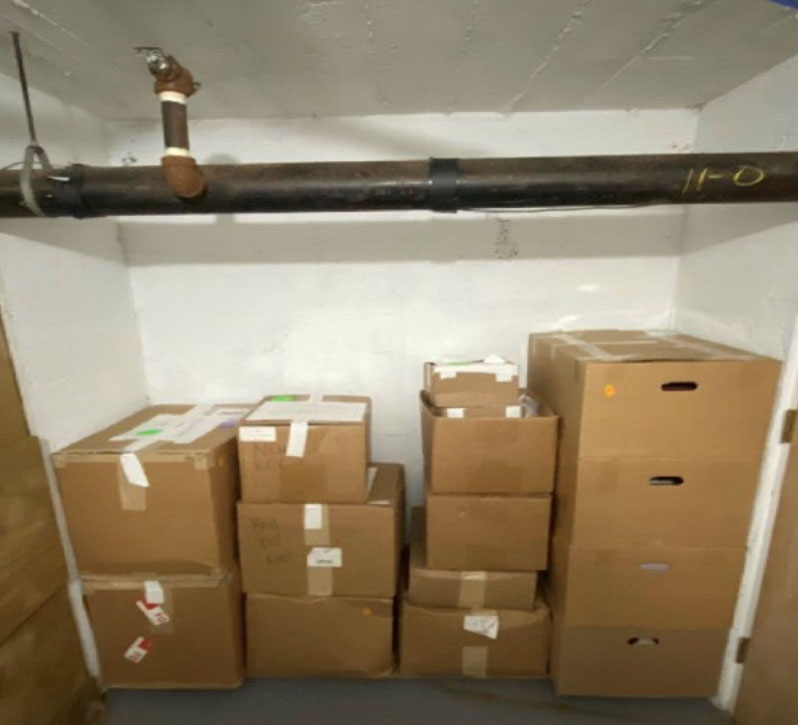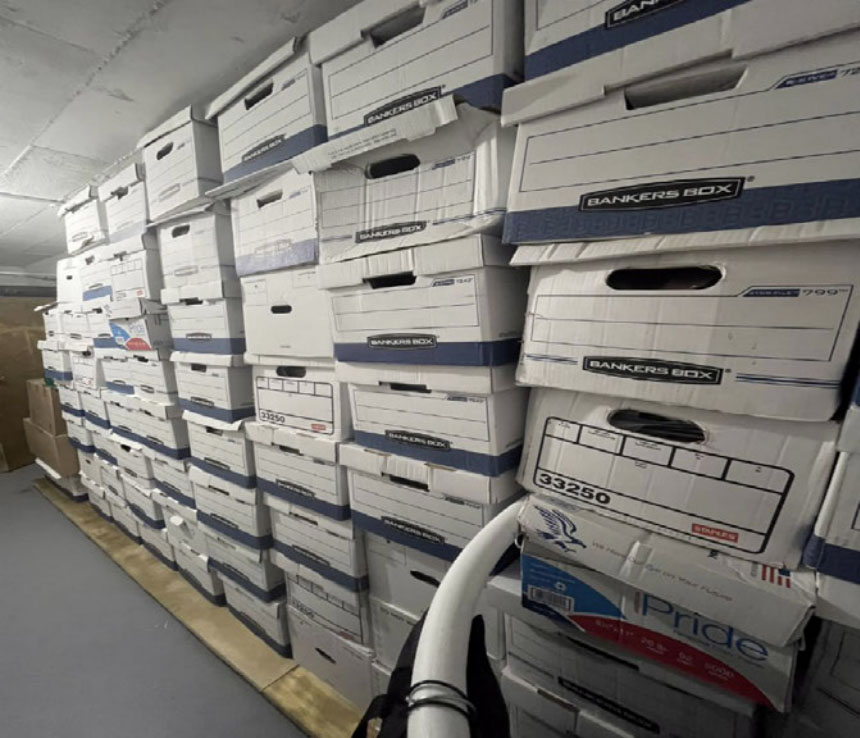Trump indicted in documents probe: What it means and what’s next
The historic federal indictment of Donald Trump on 37 counts related to the mishandling of government documents has raised many questions about the legal repercussions for the embattled former president as he tries to regain the White House.
The Post looks at the first-ever federal case against a sitting or former president and what happens to the 76-year-old GOP frontrunner now.
What is an indictment?
An indictment is a formal charge of a serious crime. When a person is indicted, they are given a formal notice signaling that a grand jury — an impartial group of 23 citizens — believe that they had committed an offense. Trump announced the news of his indictment Thursday night, after federal prosecutors informed his lawyers of the charges.
What is in Trump’s indictment?
The Justice Department’s unsealed indictment revealed Trump faces 31 counts of willful retention of national defense information, one count of conspiracy to obstruct justice, one count of withholding a document or record, one count of corruptly concealing a document or record, one count of concealing a document in a federal investigation, one count of scheming to conceal a document or record and one count of making false statements.
Walt Nauta, who worked in the Trump White House and later as a body man for the former president at Mar-a-Lago, was also indicted on one count each of conspiracy, withholding, corruptly concealing, concealing, scheming to conceal and making false statements to federal investigators.
How did the case come about?
Officials with the National Archives and Records Administration contacted Trump’s representatives in the spring of 2021 when they realized that important material from his time in office was missing from their collection.
A Trump flack told the Archives in December 2021 that records responsive to their request had been found at his Mar-a-Lago estate. In January 2022, the National Archives collected from the Palm Beach home 15 boxes of documents, including 197 classified documents, of which 98 were “secret,” 30 were “top secret” and others that were “confidential.”
That May, the FBI and the DOJ issued a subpoena for all remaining classified records in Trump’s possession, 38 of which were picked up on June 3.
Prosecutors say a Trump attorney who arrived at Mar-a-Lago a day earlier to examine the records was shown a basement storage room where additional boxes containing White House documents and other materials were kept, while other boxes remained in the former president’s residence at the resort.
Over the course of the past year, Nauta allegedly had moved boxes from the White and Gold ballroom, to the business center and to a bathroom and shower in the Lake Room.
Nauta eventually moved the classified documents to a basement storage room, where they were easily accessible via an entrance to the pool patio, which “was often kept open,” according to prosecutors.
Boxes in the storage room fell at one point, showing a “secret” file containing intelligence information from allies in the US, UK, Canada, Australia and New Zealand, according to text messages with images that prosecutors obtained.
Others were flown to the former president’s golf club in Bedminster, N.J., where he was later recorded on tape discussing them with a writer, a publisher and two aides. None had security clearances.
Trump also showed a classified map of a foreign nation to a member of his political action committee at the golf resort, who also did not have a security clearance. The former president also allegedly admitted to the representative that he was not supposed to have shown him the file.
Nauta turned in classified material to the Archives on Jan. 17, 2022, but the FBI opened a criminal investigation two months later and a grand jury was also empaneled and issued a subpoena to search for more.
Trump allegedly suggested to his attorneys ways in which the documents might not be made available, either through not responding to the subpoena or making sure “there are no documents.”
Without his legal counsel’s knowledge, prosecutors say, Trump then told Nauta to transfer boxes between his residence and the storage room.
On Aug. 8, FBI agents returned and searched Mar-a-Lago in accordance with a warrant approved three days earlier by US Magistrate Judge Bruce Reinhart. Investigators retrieved thousands of documents, 102 of which had classification markings.
Do presidents often keep classified material after leaving office?
They’re not supposed to, but they do. Under the post-Watergate Presidential Records Act, any records handled by the president or vice president as part of their official duties revert to the federal government in the form of the National Archives upon the conclusion of each administration.
However, Archives COO William Bosanko told lawmakers in March that every presidential administration covered by the act has stored “classified information in unclassified boxes.” Bosanko explained that sensitive records become easily lost or mingled with regular documents because the White House treats its various offices as “open storage,” to which multiple individuals have access and the ability to move papers in and out.
Upon discovering that classified material is in their possession, former presidents and vice presidents are required to contact the National Archives and return it in a timely manner.
The Archives in the past has authorized records to be moved to some presidential libraries outside of Washington, DC, including for former President George W. Bush in Dallas, Texas, and for former President Bill Clinton in Little Rock, Ark.
Here's what to know about former President Donald Trump's federal indictment
Former President Donald Trump has been indicted by a federal grand jury on charges related to mishandling classified White House documents that were recovered at his Mar-a-Lago estate in Florida.
Trump unlawfully kept hundreds of documents after leaving office — including papers detailing America’s conventional and nuclear weapons programs, potential weak points in US defenses, and plans to respond to a foreign attack, federal prosecutors charged Friday.
The 45th president stored boxes containing the documents throughout his estate, including “a ballroom, a bathroom and shower, an office space, his bedroom, and a storage room,” according to a 49-page indictment filed in Miami federal court Thursday.
Follow The Post’s coverage of former President Trump’s federal indictment
- Trump indicted on 7 charges — including under Espionage Act — in Mar-a-Lago classified documents case
- Federal indictment against former President Trump unsealed
- New York Republicans slam Trump indictment as ‘witch hunt’
- Donald Trump’s legal team gets shakeup as two top attorneys resign after indictment
- Trump indicted in documents probe: What it means and what’s next
- On trial: What was in the mind of Donald Trump?
- Melania Trump stone-faced arriving in New York ahead of husband’s indictment
- Trump rejected lawyers’ efforts to settle classified docs case: report
The indictment against Trump was unsealed hours after the 77-year-old announced he had been charged by Jack Smith, the special counsel tapped in November to examine Trump’s retention of official documents at Mar-a-Lago.
The indictment is the former commander-in-chief’s second since leaving office and marks the first time in US history a former president has faced federal charges.
In April, Trump pleaded not guilty to 34 felony counts brought by Manhattan District Attorney Alvin Bragg related to hush-money payments made to porn star Stormy Daniels prior to the 2016 election.
The practice has lessened in recent years with the move toward digital archives.
Presidents from Herbert Hoover to Jimmy Carter donated their records to the National Archives when they left office, while former President Barack Obama, through his foundation, will pay for the cost of digitizing unclassified paper records and moving other classified and unclassified records into an Archives facility.
The Obama Foundation will build a separate Presidential Center that will not store records from his time in office, according to the Archives.
Trump had not informed the Archives that he intended to house any records in a presidential library by the end of his administration, according to its public affairs office.
So why is Trump being charged?
An aggravating factor appears to be the former president’s reluctance to cooperate with the National Archives, the FBI and DOJ.
Two weeks after the Aug. 8 search, the New York Times reported that Trump had resisted requests to return boxes of documents from his presidency, saying the material was “mine.”
More worryingly for Trump from a legal perspective, the former president’s attorneys handed over a letter to federal investigators June 3, 2022 avowing that a “diligent search was conducted of the boxes” taken to Mar-a-Lago from the White House as Trump departed office and that “any and all responsive documents accompany this certification.”
The letter was signed by Christina Bobb, the designated custodian of Trump’s records. Bobb was interviewed by the FBI in early October.
Will Trump be arrested?
Trump said in a social media post that he had been summoned to appear in federal court in Miami next Tuesday at 3 p.m. He is expected to be taken into custody after his surrender, fingerprinted and booked before facing a judge, but it is extremely unlikely that he will be jailed after his arraignment.
What happens next?
During next week’s arraignment, Trump may be asked to enter a plea, and a judge will set conditions for his release after hearing from prosecutors and Trump’s lawyers. The judge may choose to impose travel restrictions on the ex-president and order him to appear in court for future hearings.
The next weeks and months will likely be devoted to discovery — the thorny process of turning over evidence in the case, which in this instance involves a trove of classified records — and the preparation of pretrial motions by both sides.
Can Trump still run for president?
Yes. Neither the federal indictment itself nor a conviction would prevent Trump from running for or winning the presidency in 2024. The 76-year-old former commander-in-chief has made no indication that he plans to drop out of the race.
Could a trial happen before the 2024 election?
It will be up to the judge presiding over the case whether it would be resolved before November 2024. Trump and his legal team will likely try to delay the verdict until after the election, while the DOJ might try to wrap up the proceedings before the Republican nominating convention next summer.
Could Trump go to prison?
If convicted on all 37 charges against him, which carry sentences ranging from 5 to 20 years, Trump could face up to 100 years in federal prison. But Trump’s conviction is far from being a forgone conclusion, with many legal experts opining that prosecutors will face an uphill battle proving that he committed a criminal offense.
Nauta faces 90 years in federal prison if convicted on all charges.
What are Trump’s other legal problems?
Trump’s legal woes are not limited to the federal indictment in the classified documents case. The billionaire businessman faces a kaleidoscope of criminal and civil investigations in various states and on various levels of the criminal justice system.
He’s already pleaded not guilty to 34 New York state counts of falsifying business records related to the Stormy Daniels hush money case. Trump is due back in Manhattan Criminal Court on Dec. 4.
In Georgia, Trump faces a state investigation related to illegal meddling in the 2020 election. Fulton County District Attorney Fani Willis is expected to announce charges in that case sometime in August.
On the federal level, Trump and his allies are being probed for their efforts to overturn the 2020 election results by putting forward a slate of “fake” presidential electors in battleground states, who falsely declared for Trump instead of President Biden.
Separately, New York Attorney General Letitia James has sued Trump and the Trump Organization, accusing them of misleading banks and tax authorities about the value of holdings including golf courses and skyscrapers to get loans and tax breaks.
James, a Democrat, is seeking a $250 million fine and a ban that would prevent Trump from ever doing business in New York. A civil trial is set for October.
Manhattan prosecutors investigated the same allegations but did not bring criminal charges.
In May, Trump was found liable for sexual abuse and defamation of former magazine columnist E. Jean Carroll in the mid-1990s. A federal jury ordered Trump to pay $5 million to Carroll. He has filed an appeal.





















